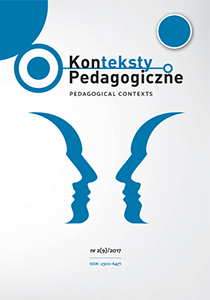Abstract
At the outset, the author presents reflections on the contemporary challenges facing education and its importance in shaping the foundation of positive relationships, communication and dialogue. The purpose of this article is to show the benefits of using an educational package “Kit Box of Secrets” in the process of teaching and educating in kindergarten, with particular emphasis on building the foundations of communication, dialogue and forming positive relations. This is an interesting way of working with a child, a group of children as well as parents in terms of children selfknowledge and the development of constructive peer and social relations in preschool education.
References
Berne, E. (2007). W co grają ludzie. Psychologia stosunków międzyludzkich. Warszawa: Wydawnictwo Naukowe PWN.
Broda, I. (2016). „Od przedszkolaka do pierwszaka”. Program wychowania przedszkol-nego. Warszawa: Wydawnictwa Szkolne i Pedagogiczne.
Engelbert, W. (2014). Jak wychować szczęśliwe dzieci. Warszawa: Wydawnictwo Zwierciadło Sp. z o.o.
Frąckowiak, M. (2011). Pozytywna komunikacja z przedszkolakiem. Wychowanie w Przedszkolu, 6, 22–28.
Goffman, E. (2000). Człowiek w teatrze życia. Warszawa: Wydawnictwo KR.
Gordon T. (2002). Wychowanie bez porażek w szkole. Warszawa: Instytut Wydawniczy Pax.
Guła, A., Urbańska, A. & Witkowska K. (2011). Kuferek Tajemnic. Narzędzia krytycznego myślenia w służbie dzieciom. Gdańsk: Wydawnictwo TOC dla Edukacji Polska Sp. z o.o.
Habermas, J. (1983). Teoria i praktyka. Warszawa: Państwowy Instytut Wydawniczy.
Kazimierowicz, M. (2012). Komunikowanie w zarządzaniu szkołą. Nowa Szkoła, 1, 7–12.
Mead, G.H. (1975). Umysł, osobowość, społeczeństwo. Warszawa: Państwowe Wydawnictwo Naukowe PWN.
Mystkowska, H. (1970). Właściwości mowy dziecka sześcio-siedmioletniego. Warszawa: Państwowy Zakład Wydawnictw Szkolnych.
Piegzik, W. (2008). Jak wspierać edukację: Przykład wykorzystania teorii komunikacji Jurgena Habermasa w pedagogice. Edukacja i Dialog, 9, 6–9.
Płóciennik, E. (2016). Rozwijanie mądrości dziecka. Łódź: Wydawnictwo Uniwersytetu Łódzkiego.
Podstawa programowa wychowania przedszkolnego dla przedszkoli oraz innych form wychowania przedszkolnego (annex to the regulation of the Minister of National Education as of 17 June 2016, item 895).
Retter H., Komunikacja codzienna w pedagogice. Gdańsk 2005: Gdańskie Wydawnictwo Psychologiczne.
Śnieżyński, M. (2008). Sztuka dialogu. Kraków: Wydawnictwo Naukowe Akademii Pedagogicznej.
Śnieżyński, M. & Nowakowska, M. (2009). Dlaczego dialog jest trudny? Próba pedagogicznopsychologicznej diagnozy. Wychowanie na co Dzień, 7–8, 9–12.
Telka, L. & Walczak. A. (2009). Dialog i mediacja w wychowaniu. Pedagogika Społeczna, 3–4, 7–24.
Wal, J. (1998). Vademecum dialogu. Kraków: Papieska Akademia Teologiczna w Krakowie, Podyplomowe Studium Dziennikarskie (skrypt).
Wieczór, E. (2014). Proces nabywania przez dzieci kompetencji językowych i komunikacyjnych. Studia Dydaktyczne, no. 2014, 341–359.
Wygotski, L.S. (1989). Myślenie i mowa. Warszawa: Państwowe Wydawnictwo Naukowe.
In accordance with the recommendation of the Ministry of Science and Higher Education, which aims to counteract the practice of “ghostwriting” and “guest authorship,” all authors submitting their text for publication should attach an author’s statement which declares the contribution of each of the authors to the article. The printed and signed statement should be delivered by mail or other means to editor-in-chief Joanna Skibska or sent in the form of a scan to the following e-mail address: redakcja@kontekstypedagogczne.pl. The authors will not receive remuneration for publishing their papers. The editors reserve the right to make minor editorial changes to the articles which will not affect the substance of the article. We encourage all authors to prepare their articles in accordance with the guidelines for manuscript preparation. Download pdf file.
Authors transfer all copyrights and grant the journal the right of first publication with the work simultaneously licensed under a Creative Commons Attribution License that allows others to share the work with acknowledgement of the work's authorship and initial publication in this journal. All authors agree to the publishing of their email addresses, affiliations and short bio statements with their articles during the submission process.

